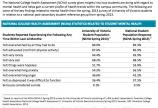Coming together for mental health
- Joanne McGachie

Alex Sterling is a busy woman. As UVic’s new student mental health programming coordinator, she is responsible for coordinating mental health events, preparing communications materials, and developing and delivering workshops for on positive mental health. Her position was created as part of UVic’s Student Mental Health Strategy (SMHS), now in its second year of implementation.
“I’ve been at UVic as an undergrad and grad, with a focus on counselling psychology and mental health,” says Sterling, who previously worked at the Resource Center for Students with a Disability. “When I saw that our campus was making student mental health a priority, in a cohesive and targeted way, I jumped at the chance to be a part of it.”
Launched in October 2014, the SMHS provides a framework to develop and implement activities that support positive student mental health and well being. As a university community, faculty, staff and students all have an impact and an important role to play in supporting and enhancing students’ potential for success.
To highlight the work of the SMHS, an event is being held on Jan. 19 from 4-6 p.m. in the foyer of the Bob Wright Building. Entitled Together we thrive: Inspiring community action on mental health, the session will be emceed by UVic’s Chancellor Shelagh Rogers, a long-time advocate for mental health issues. The keynote speaker will be Dr. Shimi Kang—mental health specialist, award-winning doctor, researcher, best-selling author and popular TEDx speaker. As well, UVic student and Olympic medalist Gillian Carleton will share her story of struggling with depression. The event is open to all students, faculty, staff and the public, free of charge.
Progress was made on a number of key initiatives in the strategy’s first year. Over 900 faculty and staff received training on how to identify, respond to, and refer students who are experiencing mental health concerns. As well, a quick reference guide was developed and circulated across campus to faculty and staff, to help them support students in distress.
Rebecca Gagan of the English department is one of the faculty members who has taken the Mental Health Literacy Training sessions. "As an instructor of first- and second-year students, I've especially benefitted from the strategy’s tools for instructors,” she says. “It’s made me more aware of how best to support my students' mental health. Most importantly, it has started a much needed conversation in our university community about mental health. This conversation alone will have significant and lasting benefits for both students and instructors."
For students, a proactive approach has involved them in mental health discussions through a website, online community, blogs, other social media, and with a variety of events. These include outreach activities undertaken by a team of students, trained and led by Sterling. The team (the Student Mental Health Leadership Program) has moved away from simply providing drop-in sessions for students seeking assistance, and instead focuses on being more hands-on with fun events such as ‘random acts of kindness’, self-care, and exam de-stressing activities.
Rita Knodel, director of UVic’s counselling services, sees the impact that the new initiative is having on campus. “We’re helping to create a more caring community and campus environment,” she says. “We’re assisting students earlier, to help prevent more serious emotional and mental stress. We have many students who want to learn about staying well and the many resources available to them. And we’re coaching many more faculty and staff on how to help distressed students so they can succeed in their academics.”
Another key aspect of the SMHS is the student mental health grant program, which provides funding to support and encourage students to create activities, events, and programs to educate, inform and engage the UVic community.
A total of $10,000 is available each academic year (September to April), with a maximum of $2,000 awarded per project. In its first year, the grant program supported five projects that included: subsidized rates for mental health first aid training; a forum and fair showcasing the connection between spirituality and well being; an ‘art hive’ space held bi-weekly; an event with speakers and performance pieces aimed at reducing mental health stigma; and a workshop aimed at combating exam stress.
There are many other resources available on the SMHS website. In addition to a wide range of contacts for assistance, students can find tips on preparing for university, self-help tools, strategies for helping friends, suggestions for making connections on campus, and more. Faculty and staff can take training in student mental health literacy, learn about ways to support and refer students who may be at risk, read up on campus safety and emergency procedures, and find the relevant university policies.
To find out more about the Jan. 19 Together We Thrive event, visit the SMHS site.
To request training for your faculty or unit, visit the SMHS training site.

